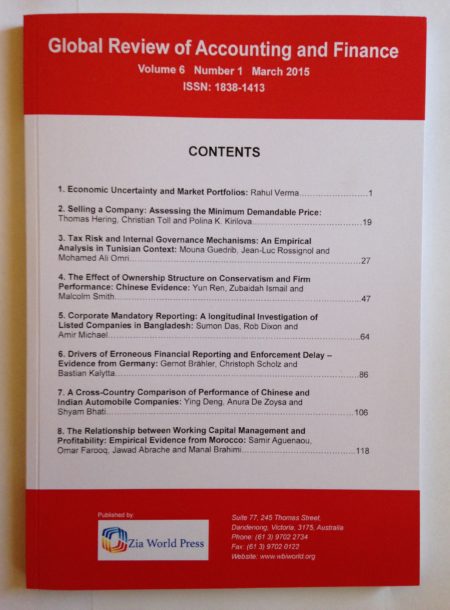Global Review of Accounting and Finance
Vol. 10. No. 2., September 2019, Pages: 66–86
Dynamic Linkages among the Equity Markets of the U.S and the European Countries: Recent Evidence based on Cointegration and Causality Tests
Mazhar M. Islam
This paper investigates the dynamic linkages among the equity markets of
the US (proxied by S&P 500), Germany(proxied by DAX30 , France
(proxied by CAC30), UK (proxied by FTSE100) and other 14 other major
Eurozone markets ( proxied by STOXX 600) using daily stock series from
March 3, 2010 through April 17, 2018. Data are collected from the
Bloomberg Database and the econometric models are estimated applying
the most recent version of Econometric software (EViews 11). Jarque-Bera
statistic shows non-normal distribution of the series. Augmented Dicky Fuller
test indicates nonstationarity in level series and stationary in first
differenced series. Applying Johansen Cointegration technique the study
finds that stock price indices of these countries have long-run (equilibium)
relationship. Applying the Granger-causality test, strong unidirectional
causality has been detected from the US to 16 European markets except
for the UK. No causality has been found from the European markets to
the US market, indicating that the US market is the leader and the Euro
markets are the followers. This is not surprising given the robust US
economic growth during the period of our study A strong unidirectional
Granger causality has been detected from Germany to the France
market with 1 through 5 days lag. A weak unidirectional Granger causality
is found from the UK to other Eurozone markets, and from the French to the
UK market. In the case of Europe, Frankfurt stock market strongly affects
the Paris bourse as well as other Eurozone markets. This result is also not
surprising given the high economic growth rates of Germany and French
during the sample period and the unfavorable impact of Britain exit from
the European Union (BREXIT).

